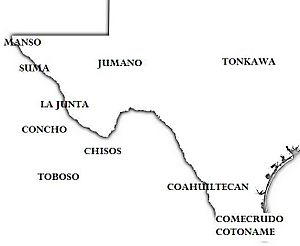Native American tribes in Texas facts for kids
Native American tribes in Texas are groups of Indigenous people who live in Texas today. This also includes the many tribes who lived in Texas long ago. Many Native Americans live in Texas, even if their tribe's main home is in another state.
Contents
Officially Recognized Tribes
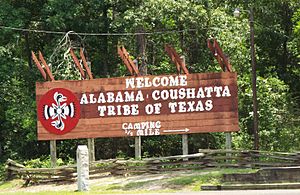
Texas is home to three tribes that are federally recognized. This means the United States government officially recognizes them as Native American tribes. To be federally recognized, a tribe must meet several important rules. For example, they must have been a Native American group since at least 1900. They also need to have a clear community and show that their leaders have power over their members.
The three federally recognized tribes in Texas are:
- Alabama-Coushatta Tribes of Texas: They originally came from areas now known as Tennessee and Alabama.
- Kickapoo Traditional Tribe of Texas: Their ancestors came from the Great Lakes region.
- Ysleta Del Sur Pueblo of Texas: This tribe originally came from what is now New Mexico.
Native American Reservations
A reservation is land set aside by the government for Native American tribes. It is land that the tribe owns and governs. There are three Native American reservations in Texas:
- The Alabama-Coushatta Reservation is located in Polk County, Texas.
- The Kickapoo Reservation is in Maverick County, Texas.
- The Ysleta del Sur Pueblo reservation is in El Paso County, Texas.

State Recognition
Some states have a way to officially recognize Native American tribes. However, Texas does not have a special process to do this. This means there are no "state-recognized tribes" in Texas. State-recognized tribes do not have the same relationship with the U.S. federal government as federally recognized tribes do.
For example, in 2021, a bill was proposed in Texas to officially recognize the Lipan Apache Tribe of Texas. But this bill did not pass.
Historical Tribes of Texas
Many different Native American tribes have lived in what is now Texas throughout history. In the 1800s, many of these tribes were forced to move to Indian Territory, which is now the state of Oklahoma. Some tribes no longer exist as distinct groups, but their descendants are still alive today.
Here are some of the tribes that once lived in Texas:
- Adai people: They lived in eastern Texas.
- Apache people: These tribes lived in western Texas, and also in Arizona, New Mexico, and Oklahoma.
- Lipan Apache: Found in the southwest.
- Salinero: Lived in western Texas.
- Teya: Lived in the Panhandle region.
- Vaquero (also known as Querecho): Lived in northwestern Texas. They might be ancestors of some Apache groups.
- Aranama: Lived in southeastern Texas.
- Atakapa: Lived along the Gulf Coast.
- Biloxi: They lived near the Neches River in the 1800s. Today, many live in Louisiana.
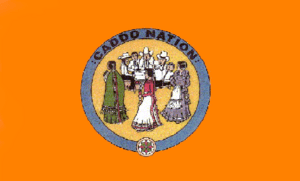
- Caddo: Lived in eastern Texas. Most Caddo people now live in Oklahoma.
- Cacachau: Lived in eastern Texas.
- Eyeish: Lived in eastern Texas.
- Hainai: Lived in eastern Texas.
- Kadohadacho: Lived in northeastern Texas.
- Nabedache: Lived in eastern Texas.
- Nabiti: Lived in eastern Texas.
- Nacogdoche: Lived in eastern Texas.
- Nacono: Lived in eastern Texas.
- Nadaco: Lived in eastern Texas.
- Nanatsoho: Lived near the Red River.
- Nasoni (Upper): Lived near the Red River.
- Natchitoches: Lived near the Red River.
- Nechaui: Lived in eastern Texas.
- Neche: Lived in eastern Texas.
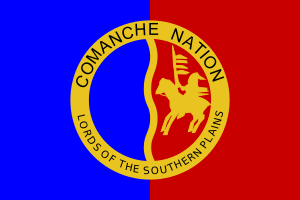
- Comanche: Lived in northern and western Texas. Most Comanche people now live in Oklahoma.
- Coahuiltecan: Lived in southern Texas.
- Comecrudo: Lived in southern Texas.
- Ervipiame: Lived in south and central Texas.
- Geier: Lived in south-central Texas.
- Pajalat: Lived in central Texas.
- Pastia: Lived in south-central Texas.
- Payaya: Lived in south-central Texas.
- Quepano: Lived in south-central Texas.
- Unpuncliegut: Lived on the south coast.
- Xarame: Lived in south-central Texas.
- Dotchetonne: Lived in northeastern Texas.
- Escanjaque Indians: Lived in north-central Texas.
- Jumano: Lived in southwestern Texas.
- La Junta: Lived in western Texas.
- Karankawa: Lived along the south coast.
- Kiowa: Lived in the Panhandle region. Most Kiowa people now live in Oklahoma.
- Manso: Lived in western Texas.
- Quems: Lived in southwestern Texas.
- Quicuchabe: Lived in western Texas.
- Quide: Lived in western Texas.
- Suma: Lived in western Texas and later joined Apache groups.
- Teyas: Lived in the Panhandle.
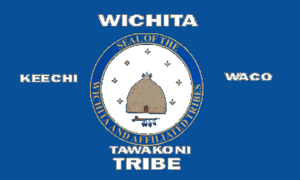
- Tonkawa: Lived in southeastern Texas. Most Tonkawa people now live in Oklahoma.
- Wichita: Lived in north-central Texas. Most Wichita people now live in Oklahoma.
Unrecognized Groups
There are more than 30 groups in Texas that say they represent historic tribes. However, these groups are unrecognized. This means they do not meet the rules to be federally recognized tribes. They are also not state-recognized tribes. Some of these groups are nonprofit organizations that focus on cultural heritage.


